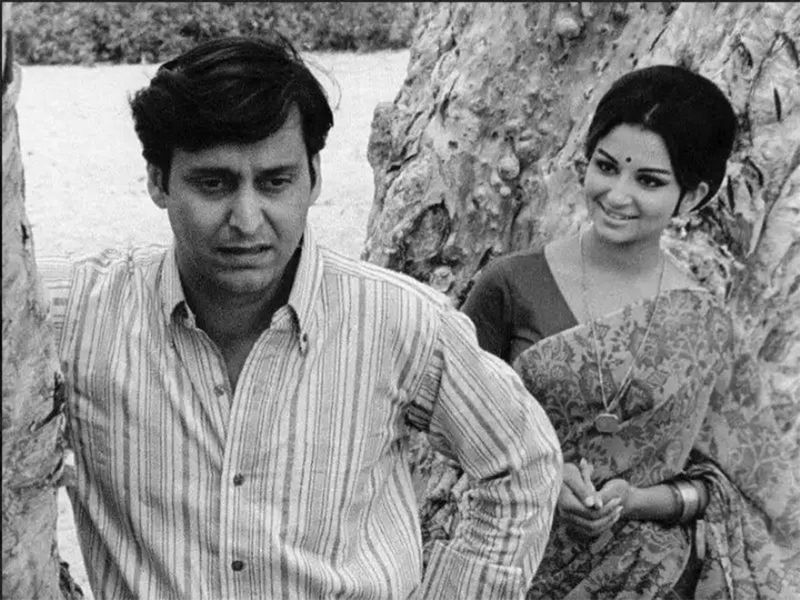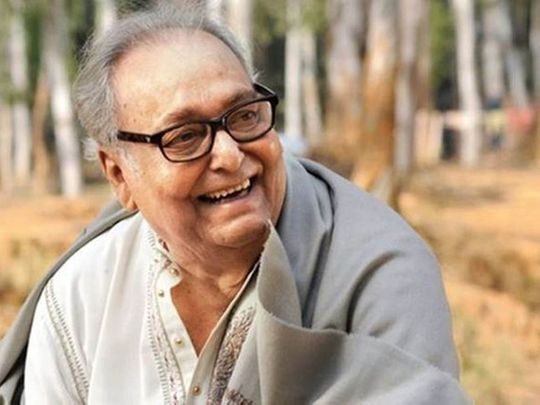He was to Satyajit Ray what Jean-Paul Belmondo was to Jean-Luc Godard (or the French New Wave) or Toshiro Mifune was to Akira Kurosawa. There must have been a good enough reason why Soumitra Chatterjee, who died due to COVID-19 on November 15, acted in 14 of Ray’s feature films – but then the 85-year-old colossus of Indian cinema was much more than that.
A recipient of Dadasaheb Phalke Award in 2012, the highest honour in Indian cinema, not to speak of Legion of Honour by the French government – Chatterjee (or ‘Chattopadhyay’ as the quintessential Bengali bhadralok would say) was one of his kind. If entertaining the audience of Bengali cinema for nearly six decades – starting from Ray to the recent breed of filmmakers like a Moinak Bhowmik is what he was best known for – he was also Bengal’s Renaissance Man in the true sense of the term in the mould of Nobel laureate Rabindra Nath Tagore and Ray.
Where else can you find a cinema actor who is also a poet – with over a dozen poetry books to his credit – an essayist, a playwright with over 15 adaptations, a theatre director and performer of more than 30 productions, an elocution artist, a painter and an editor for two decades of Ekshan, one of Bengal’s most respected but now defunct literary magazine. As he himself often candidly admitted, acting in movies may have provided him the bread and butter but theatre and literature remained two of his first loves.
READ MORE
When COVID-19 struck him in early October, Chatterjee had just finished shooting for his own documentary, being directed by Parambrata Chattopadhyay, a cerebral actor-director of this generation. There aren’t very many octogenarian actors around the globe who are active – let’s not talk about exceptions like a Al Pacino, 80 and Robert De Niro, 77 combining for ‘The Irishman,’ for it’s a different universe out there in the regional film industry which was Chatterjee’s playing field.
His health had been failing him for quite sometime with age, while a severe bout of penumonia last year had put restrictions on his shooting schedule. Chatterjee, however, carried on regardless – appearing as the patriarch of Bengali joint families, doting grandfathers or the hapless father who is afflicted with dementia.
His admirers would often wonder if he actually needed to sweat it out with an infirm body – which had withstood the ravages of a prostrate cancer some years back, but it was also for the material necessities which forced him to accept such offers. It was three years back that the family was struck by a cruel blow of fate when Ranadeb Bose, his bright, young grandson who was just carving out a niche for himself in Bengali film industry, met with a horrible road accident which left him with a several neurological disorder.
‘Rono,’ as he was popular as – is still bedridden – and the recurrent bills for his medical expenses had been a steep one but Chatterjee and his daughter Poulumi had been soldiering on. Asked how did he manage to retain focus on his work during a TV interview sometime back, he came up with an poignant answer: ‘’Do I have any other option? Also, I am accountable to my viewers also who have showered me with so much of love and affection. Yes, I do have my moments of grief, but they are too private.’’
While it will not be an exaggeration to say that Ray brought out the best in him, Chatterjee nevertheless straddled between both the artistic and inane forms of cinema in Bengal with elan – never sacrificing on the realistic approach to acting in the bargain.
From being Ray’s ‘one-man stock company’ (as Pauline Kael coined him) – he moved more into the commercial Bengali films as a typical hero with the occasional songs in his lips which went on to become timeless hits.

Image Credit: Gulf News Archive
However with age, he smoothly transited to character roles that were commensurate with his natural, graceful ageing. The fruits were in the teacher’s role who witnessed a political murder in Atanka (1986), the dictionary-writer who struggled like a sage in Ekti Jiban (1990), the blind Leftist poet in Dekha (2001) or the benevolent old man who fixes others’ problems in Rupkatha Noy (2014).
There were a number of iconic roles as well – as the thief Aghor in Tarun Majumder’s Sansar Seemante (1975) or the paralytic doctor who moves in a wheelchair and fights for his differently-enabled patients in Tapan Sinha’s Wheel Chair (1994). There had been so many outstanding performances but his portrayal of Kshit da, a swimming trainer with indomitable spirit and inspiration in Kony (1986) still remains etched in memory.
It was more than two decades back that Catherine Berge made an exceptional documentary tribute, ‘Gaach’ (The Tree) on Chatterjee in 1998. Berge filmed it in Kolkata with support from director James Ivory and producer Ismail Merchant and working with the other Bengali actors who had also appeared in the films of Satyajit Ray. Produced by Merchant and Ivory, the film was originally screened in Paris and Venice in 1997. In 2016, ‘Gaach’ was screened again at the Paris Cinémathèque during a Satyajit Ray Retrospective.
“I have always been in doubt about my work. I always thought that entertainment business was not worthwhile but time and again for more than 50 years I have been accepted, loved and made to feel as one of my own by my countrymen” – these are words from him in his acceptance speech for the Phalke award in 2012.
It’s a cliché alright – but certainly no exaggeration to say – they don’t make men like Soumitra Chatterjee anymore!
The Ray-Soumitra collaboration
Apur Sansar (The World of Apu, 1959)
Devi (The Goddess, 1960)
Teen Kanya (Three Daughters, 1961)
Abhijan (The Expedition, 1962)
Charulata (The Lonely Wife, 1964)
Kapurush-o-Mahapurush (The Coward & the Godman, 1965)
Aranyer Din Ratri (Days and Nights in the Forest, 1969)
Ashani Sanket (Distant Thunder, 1973)
Sonar Kella (The Fortress, 1974) as Feluda
Joi Baba Felunath (The Elephant God, 1978)
Hirak Rajar Deshe (In the kingdom of diamonds, 1980)
Ghare Baire (The Home and The World, 1984)
Ganashatru (Enemy of the People, 1989)
Shakha Prasakha (Branches of a Tree, 1992)

